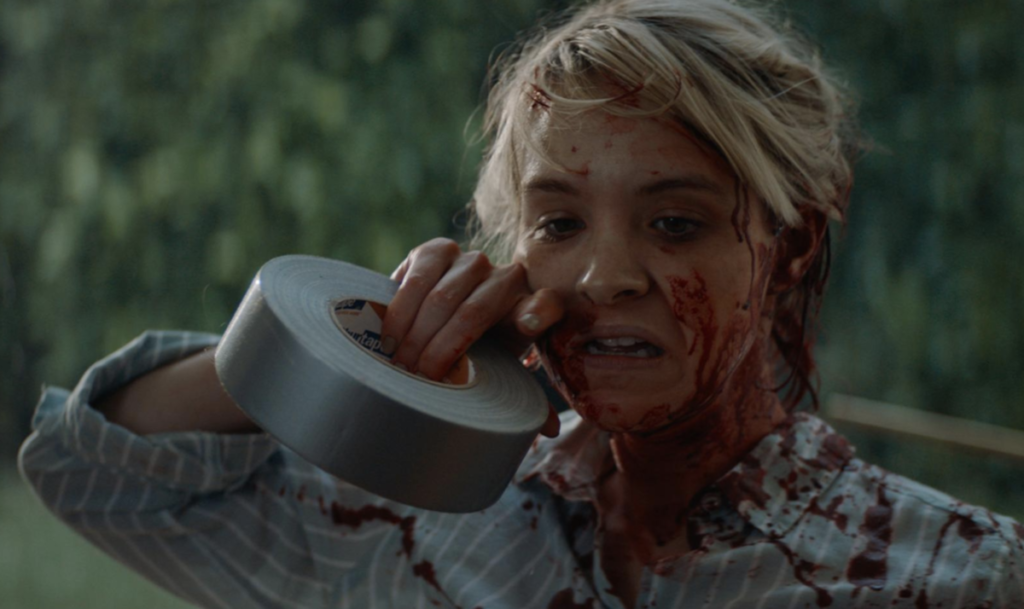
Lucky: Something Blurry
In horror or thrillers, putting the viewer ahead of the characters never ends well. Good horror ejects the audience from the perception of the film itself as horror, and instead immerses us in character and atmosphere, to the point where twists and turns come across with genuine surprise.
In other words: it’s the difference between having an experience and having an experience dictated to you, thereby negating any sense of discovery or visceral impact.
Unfortunately, Natasha Kermani’s Lucky falls into the latter category.
Hitchcock – and Hitchcock proteges like Brian De Palma – rooted their fantastic premises in reality, threading plotlines with such skill that it wasn’t until you were in the thick of abnormality that you realized the world had irrevocably changed, putting the characters – and the viewer – past the point of no return. This creates an atmosphere that forces us to see absurdity through to the end.
Consider Hitchcock’s Psycho or De Palma’s Sisters, where conceptual “reality” becomes something blurry. This sensation can be thrilling or terrifying (or both). The point is, taking the familiar and turning it into something distorted without the audience noticing is a perverse magic trick in and of itself.
Distortions of Reality
That said, Lucky stumbles right out the gate, presenting May (Brea Grant, who also wrote the script) and Ted (Dhruv Uday Singh) as a couple who confront a masked killer in their home each night. During the opening scene, Ted confirms that this will happen, and continue to happen. Why?
Within minutes of a film like Hausu, we are plunged into a bizarre distortion of reality. It reverses the standard horror formula, with emotion and humor rising from scenarios that grow increasingly unhinged. In this instance, so-called “reality” begins to shine through the collective madness.
Lucky seems to start at the beginning of its second act (which may explain its 80-minute run time), with May and Ted entrenched in their “Happy Death Day by way of Carnival of Souls” metaphysical nightmare. We get a quick impression of May’s backstory (she’s a self-help writer struggling with her next book), but even her encounters with outsiders (cops; paramedics; her agent) smack of semi-jokey Lynchian wackiness.
Logic Through Illogic?
For a while, we think May is stuck in an existential loop of confronting the masked man and going over the story with the apathetic authorities, only to repeat the scenario – with slight variations on the outcome – ad nauseam. Leading with this approach raises certain expectations: perhaps the film will mine some unique internal logic through the seemingly outward illogic of the plot. Or maybe a logical explanation will be affixed to the eventual outcome (the “it was just a dream” reveal being a worst-case option).
Lucky‘s narrative path is questionable at best. It jerks the viewer like a yo-yo, but its outcome is a thoroughly dissatisfying letdown. There are many themes threaded throughout Grant’s script: May’s independence; the possibility she doesn’t believe what she writes; victim-blaming; contempt for people’s neediness; the possibility that the masked man is a manifestation of something she doesn’t want to face; helping others only when it’s convenient; and the sensory overload of being assaulted from all angles (whether by words or actions).
There’s a lot going on here. The problem is, of all the themes brought to the surface, most are left unexplored or unresolved. With so much on its mind, Lucky manages to articulate no single point clearly.
Too Much and Not Enough
Adding to the frustration is the level of talent involved: Grant is skilled in front of and behind the camera (she wrote and directed last year’s darkly comedic 12 Hour Shift), Singh strikes a distinct rhythm with his bizarre, semi-comedic line delivery, and veteran character actor Larry Cedar (The Crazies remake) steals several scenes as a nonplussed cop. Hunter C. Smith has presence as the masked man, but Lucky‘s setup reduces his appearances more to an obligation than a genuine threat.
Kermani’s previous film, Imitation Girl, created a perceptive dual-character study that relied on sounds and images to make profound points on the human condition. With Lucky, her scene compositions are meticulously detailed, from a dimly-lit parking garage to the sunset illuminating May’s encounter with a skeptical social worker. It appears that Kermani wanted to go from genre-bending science fiction to a similar subversion of horror formula.
For as much as I’ve enjoyed Grant’s filmography, her script is this year’s Us: where concepts alone do a movie make. Said concepts don’t have to connect to greater themes, characterizations, or aesthetics: they just need to exist. And by virtue of their existence, something like Lucky becomes more than passable in mainstream critical circles. Maybe I’m the crazy one, thinking this and Us sets up a bunch of fine-looking dominoes, but somehow forgets to knock any over.
At its final image, Lucky left me frustrated and bewildered. I wasn’t wondering how all its errant threads intertwined, but why they didn’t intertwine better. There’s at once too much and just not enough here, and that may be the singular paradox the film successfully conveys.
1.5 out of 5 stars
The Plot Sickens: Jonny Numb reviews Rent-A-Pal!
Crash Analysis Support Team

Jonny Numb
Jonny Numb (aka Jonathan Weidler), against all odds, is limiting his screen time. He co-hosts The Last Knock horror podcast, and his writing can also be found at The Screening Space. Miscellaneous musings occur behind the anonymous shields of Twitter and Letterboxd @JonnyNumb.
THE LAST KNOCK horror podcast is a Crash Palace Productions’ featured show. Besides this site, you can find THE LAST KNOCK on iTunes and Spotify and more, with new shows posted every other Sunday at 9 PM ET.
Crash Palace Productions website design and creation from Brian Yount Digital Enterprises with banner and THE LAST KNOCK art from Palko Designs. Logo designs from Paul Belci.
(Lucky movie still from Epic Pictures Group.)
